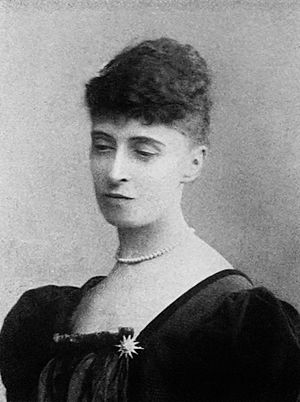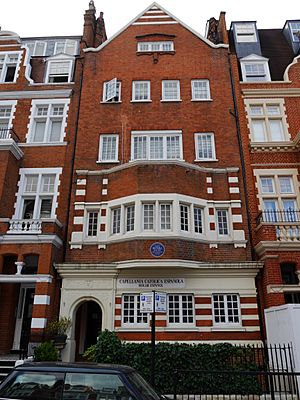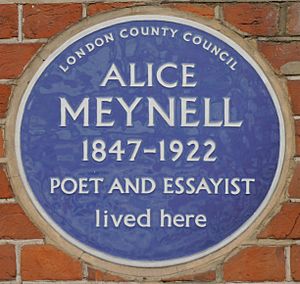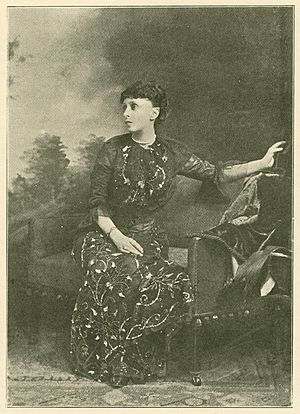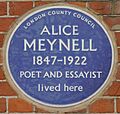Alice Meynell facts for kids
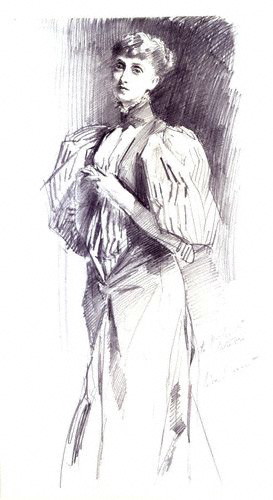
Alice Christiana Gertrude Meynell (born Thompson; 11 October 1847 – 27 November 1922) was a British writer, editor, and critic. She is mostly remembered today as a poet. She was also a suffragist, meaning she supported women's right to vote.
Contents
Early Life and Family
Alice Christiana Gertrude Thompson was born in Barnes, London. Her parents were Thomas James and Christiana Thompson. Her family moved often, living in England, Switzerland, and France. However, Alice grew up mostly in Italy.
In 1877, Alice married Wilfrid Meynell. He was five years younger than her. They had eight children together. Two of their children became well-known writers. Viola Meynell (1885–1956) became a fiction writer. Their youngest child, Francis Meynell (1891–1975), became a poet and a printer. He even helped start a famous publishing company called The Nonesuch Press.
Writing and Career
Alice Meynell's first book of poems was called Preludes, published in 1875. Her older sister, Lady Elizabeth Butler, drew the pictures for it. A famous art critic, John Ruskin, praised her work. He especially liked her poem "Renouncement."
Alice and her family became members of the Catholic Church. After this, her writing often focused on religious topics. This led her to meet Wilfrid Meynell, who was a Catholic newspaper publisher. They married in 1877 and lived in Kensington, London. Together, they owned and edited several magazines. These included The Pen, the Weekly Register, and Merry England.
Alice was very busy with her editorial work and her own writing. She wrote poems and essays. Her work often showed her interest in women's rights. She also wrote about her feelings during World War I.
The Meynells helped a struggling poet named Francis Thompson. He sent them his poems, and they published them in their magazine, Merry England. They supported him, and his book Poems was published thanks to their efforts.
Alice Meynell was a strong supporter of women's right to vote. She was a vice-president of the Women Writers' Suffrage League. This group worked for women's voting rights from 1908 to 1919. She also helped start the Catholic Women's Suffrage Society. This group supported peaceful ways to achieve equal voting rights for women.
In 1915, Alice wrote in the first issue of their newspaper, The Catholic Suffragist. She believed that Catholic women had even stronger reasons to support voting rights. She wrote that if men and women had more equal power, the world might not have so many wars. She strongly disagreed with those who spoke against votes for women. She saw women's suffrage as a "fortress of safety" for Catholic women.
Later Life and Legacy
Alice Meynell was considered twice for the important role of Poet Laureate of the United Kingdom. This honor is given to a poet by the monarch. She was thought of for the role in 1892 and again in 1913. However, she was not chosen. Carol Ann Duffy became the first woman to hold this position in 2009.
Alice Meynell faced several illnesses, including migraines and depression. She passed away on 27 November 1922, at the age of 75. A collection of her final poems was published after her death. She is buried in Kensal Green Catholic Cemetery in London. There is a special blue plaque on the house at 47 Palace Court in London. This plaque shows that Alice and her husband once lived there.
Selected Works
- Preludes (1875) – a book of poems
- The Rhythm of Life and Other Essays (1893) – a collection of essays
- Poems by Francis Thompson (1893) – she helped edit and produce this book
- John Ruskin (1900) – a book about the art critic
- Later Poems (1902) – another book of poems
- Childhood (1913) – a book about childhood
- Essays (1914) – a collection of her essays
- The Poems of Alice Meynell: Complete Edition (1940) – a full collection of her poems
Images for kids
-
Meynell by John Singer Sargent, pencil, 1894
See also
 In Spanish: Alice Meynell para niños
In Spanish: Alice Meynell para niños
 | James Van Der Zee |
 | Alma Thomas |
 | Ellis Wilson |
 | Margaret Taylor-Burroughs |


